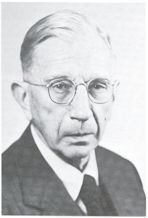John G. Brainerd
- Birthdate
- 1904/08/07
- Birthplace
- Philadelphia, PA
- Death date
- 1988/02/01
- Associated organizations
- University of Pennyslvania
- Fields of study
- Computing
- Awards
- IEEE Founders Medal
Biography
John Grist Brainerd was born in Philadelphia, Pennsylvania, on August 7, 1904. During his undergraduate years he worked as a reporter for the Philadelphia "North American" newspaper. He received a B.S.E.E. from the University of Pennsylvania in 1925, and in that same year started work as an instructor in the Department of Electrical Engineering. He received a. Sc.D. from the University of Pennsylvania in 1934, and was appointed Professor and Chairman, Division of Physical Sciences, Graduate School of Arts and Sciences in 1942. In 1954 he became Director of the university’s Moore School of Electrical Engineering. Decades earlier, in 1928, he was partially responsible for inducing Dean Pender of the Moore School to start evening courses leading to a Master's Degree, an innovative project for the time.
Brainerd accomplished much in his years at the University of Pennyslvania, more than tripling the professional faculty of the Moore School, from fifteen to more than fifty, and vastly increased the number of Ph.D.s awarded annually. In 1953 he organized what was probably the first graduate program in Systems Engineering. Subsequently, he organized and chaired the Workshop in Systems Engineering, held at the Moore School in 1961, attended by representatives of almost every accredited engineering school in the U.S. and Canada.
Brainerd's professional work also went beyond campus. He was also the prime organizer of the Professional Group on Circuit Theory and served as its Chairman from 1949-1951, a group that grew to several thousand members. He was also the organizer and became a permanent member of the steering committee of the International Solid States Circuits Conference held annually in Philadelphia. Brainerd was a member of the Inter-University Committee on Biomedical Engineering out of which grew the cooperative biomedical engineering program involving the University of Pennsylvania, Johns Hopkins University, and the University of Rochester.
ENIAC
Brainerd is perhaps most famous for his work leading the ENIAC project. During World War II the differential analyzer at the Moore School was used intensively for ballistic computations under contract to the Army Ordnance Department. It became evident to Brainerd that if this work was to continue at its rate of growth, the work would outrun the capability of the facility. It was in this atmosphere of pressure that led to the inception of ENIAC (Electronic Integrator and Calculator) project in 1946, the world's first large-scale electronic digital computer. It was under Brainerd's inspiration, leadership, and supervision the ENIAC was conceived and built. In addition to Project ENIAC, he was supervisor of an Automatic Data Retrieval System which provided large-scale team consulting services to the Signal Corps on what was then the largest interconnected computer system yet conceived.
Publications, Professional Organizations, and Honors
Brainerd published his first paper "Mathematical Theory of the Four-Electrode Valve" in the June 1929 Proceedings of the IRE, and was co-author with Knox McIlwain of the book "High Frequency Alternating Currents", published in 1931. His second text book (coauthored), entitled "Ultra High Frequency Techniques", was widely used in the U.S. and translated into many languages for use abroad.
Brainerd held numerous offices within the IEEE including: Chairman of the Philadelphia Section, Member of National Board of Directors, Chairman of Life Member Fund Committee, Chairman of Standards Committee, Chairman of Professional Group on Education, Member of ADCOM for the Professional Group of Systems Science and Cybernetics. In addition he served as Vice-President of the Society for the History of Technology, a member of the American Standards Association, a member of the Advisory Committee to the National Bureau of Standards, a U.S. delegate to the IEC, and as a member of the Committee of Arts and Sciences of the Franklin Institute.
Brainerd was awarded the 1975 IEEE Founders Medal "For his leadership in electronics in fields encompassing computer technology, high frequency techniques, engineering education, and national and international electrical standardization."
Further Research
The Computer Pioneers: ENIAC - A video oral history with much of the ENIAC development team including Brainerd as well as Kay Mauchly, Herman Goldstine, Dave Mackey, and Richard Clippinger
"John G. Brainerd, 83, Early Computer Expert." New York Times. February 5, 1988.
ENIAC Trial Exhibits Master Collection. University of Pennsylvania Archives
Weik, Martin H. "The ENIAC Story". Ordnance. (Washington DC: American Ordnance Association, January-February 1961)
